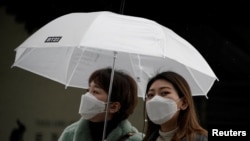Coronavirus outbreaks inside two South Korean medical facilities reveal the vulnerability of people with disabilities to the disease that appears poised to become a global pandemic.
On Tuesday, local media reported that 11 of 30 residents of a private, care center for the disabled in North Gyeongsang province have contracted COVID-19. An additional 10 employees, half of whom also have a disability, also tested positive for the pneumonia-like virus.
According to the Grain of Wheat Love House, it's remaining residents and staff have been quarantined inside the facility, which has undergone disinfection.
"We apologize for the public concern caused by this unexpected situation,” said a notice posted on the charity’s website. This came just days after a surge of infections at the Daenam Hospital in Cheongdo county, a region in the same province that Seoul has designated as a “special care zone.” At least 100 patients in the complex’s psychiatric ward were sickened from the coronavirus.
The Korea Center for Disease Control (KCDC) said by midday on Wednesday that more than1000 people have been infected with COVID-19 and that seven of the country’s 12 -deaths attributed to the illness originated at the Daenam Hospital.
Kim Hyun-chung, a psychiatrist who formerly counseled patients for nine-years at a general hospital in Seoul, says conditions inside such treatment centers are fertile ground for the transmission of diseases.
“If a patient has a chronic mental health condition, like depression or schizophrenia, social norms can deteriorate and they might not take care of their hygiene,” she says, adding that it's the responsibility of the typically over-worked medical staff to ensure that patients shower and brush their teeth, for instance.
Kim says rooms in South Korean hospitals often sleep up to six patients as well as their caregivers- increasing the potential spread of a virus among people who are already sick. And psychiatric facilities don't always receive the same resources given to other hospital departments, she explains.
“Mental health wards don't make a lot of money for the hospital,” she says.
The South Korean healthcare system has come under criticism for its reliance on institutionalizing people with a mental health disability.
“Korea needs to reduce the level of dependence on long-term treatments in hospitals,” according to a study published last year in the International Journal of Mental Health Systems. “Many patients become long-term residents at these facilities and lose their will to return to their own communities.”
In response to the coronavirus outbreak at the Daenam Hospital, Seoul’s Ministry of Health says it will test patience at around 420 other mental health clinics across the country.
For Kim, the psychiatrist, the outbreak is a reminder of how economic necessity as well as a sense of “shame and stigma” compel many South Korean families to “lock up” their loved ones who are suffering from mental illness in these institutions- putting them at greater risk of contracting diseases like COVID-19.
Concern over quarantines
The World Health Organization has warned countries to prepare for the spread of the new coronavirus, suggesting that the disease could soon be declared a pandemic.
“Does this virus have pandemic potential? Absolutely it has,” Tedros Adhanom Ghebreyesus, Director-General of the WHO told reporters in Geneva on Tuesday” Are we there yet? From our assessment, not yet.”
The majority of the more than 80-thousand cases of COVID-19 and at least two-thousand related deaths are still centered in China, where authorities have virtually locked down the city of Wuhan, where the disease was first detected, as well as much of surrounding Hubei province. And as clusters of the virus have spread in South Korea, Iran and Italy, governments are stepping up quarantine efforts and in some cases have limited access to and from affected areas.
These enhanced measures concern Alex Ghenis at the World Institute on Disability in Berkley, California.
“Somebody with an intellectual, developmental or psychological disability may experience heightened anxiety and stress-related factors if they are isolated,” he writes in a message to VOA. “People with other disabilities will surely have extra stresses due to managing disability-related life factors while under quarantine.”
Ghenis says that during times of panic brought on by a public health emergency, people with disabilities could be viewed as “pariahs” due to incorrect perceptions that they inherently have compromised immune systems.
He adds that if healthcare workers start to prioritize treating coronavirus patients who they determine would be “most likely to survive”, a person with a mobility, sensory or cognitive impairment could be regarded as “lower on the triage list.”
Official announcements and other important information must also be accessible for all, including making printed material available online so that it can be read by a visually impaired person using assistive technology or having a sign language interpreter on stage during televised press conferences.
The South Korean disability news site Be Minor reported this week that the deaf are unable to call the KCDC hotline since it does not offer a video service that would allow communication by signing, adding that for the same reason, over the phone consultations with doctors are also inaccessible.
“Hearing-impaired people also have the right to receive information and counseling for infectious diseases,” said an unnamed disability advocate quoted in the article.
The report says people who are hard of hearing can still send text messages or chat through the KakaoTalk app with healthcare officials, but this service is only available during business hours Monday through Friday.





